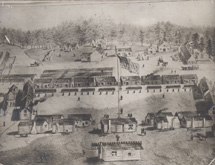 | ||||||||||||||||
| ||||||||||||||||
Camp Dodge1st N.Y. Mounted Rifles, Suffolk, Va.There were strict Army regulations concerning the formation of camps. They were laid out in a grid pattern with the officers' quarters at the front end of each street and enlisted men's quarters lined up at the rear. Each company's colors (flags) were displayed outside the tent or log cabin. Log cabins were used for winter lodging and canvas tents were used during the summer. Camps were dirty places -- full of mud in the spring, ice and snow in the winters and swirling dust in the summers. There was often little water, either for drinking or bathing. Food was supplied by the government but often supplies were held up by battle or weather, and the troops were forced to live off the land, or to ask for or take provisions from the local population. Food, when it came, was in the form of salted beef, called "salt-horse" or raw pork; "hardtack," flour and water crackers that were so hard that men called them "teeth dullers," and vegetables in the form of a dried packet of beans, onions, turnips, carrots and beets, along with roots, leaves and stalks, called "dessicated vegetables." Cooking took place in the mess halls or just outside the cabins on an outdoor fire. Cooks were often African-American men who were denied combat duty and relegated to menial tasks. Life in these camps was extremely difficult -- there was much hunger, sickness, boredom, fear and death. When there was no battle, there was drill, and drill, and more drill. Otherwise, soldiers occupied themselves with card playing, baseball, letter writing, gambling, and drinking. Sometimes officers' wives and even their children accompanied them at the camps. At times soldiers' wives ended up at the camp because they had no place else to go. These wives would act as nurse, cook or launderer. Safety was a great concern but many wives remembered these days at the camp as exciting and challenging. Other suggested Web sites: Life in a Civil War Army Camp (www.civilwarhome.com/camplife.htm) Citation - Document 38 Additional Documents:
|
||||||||||||||||
